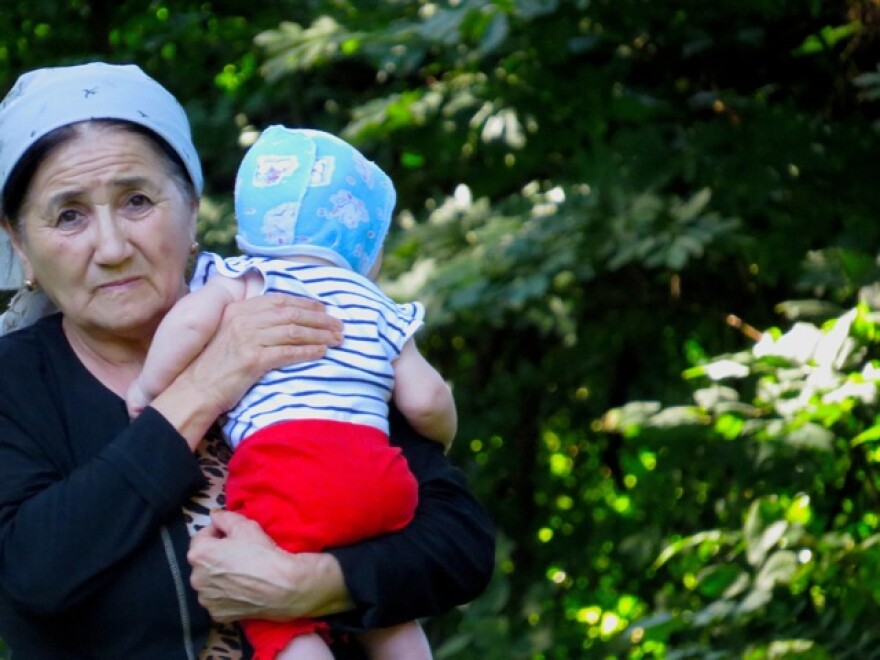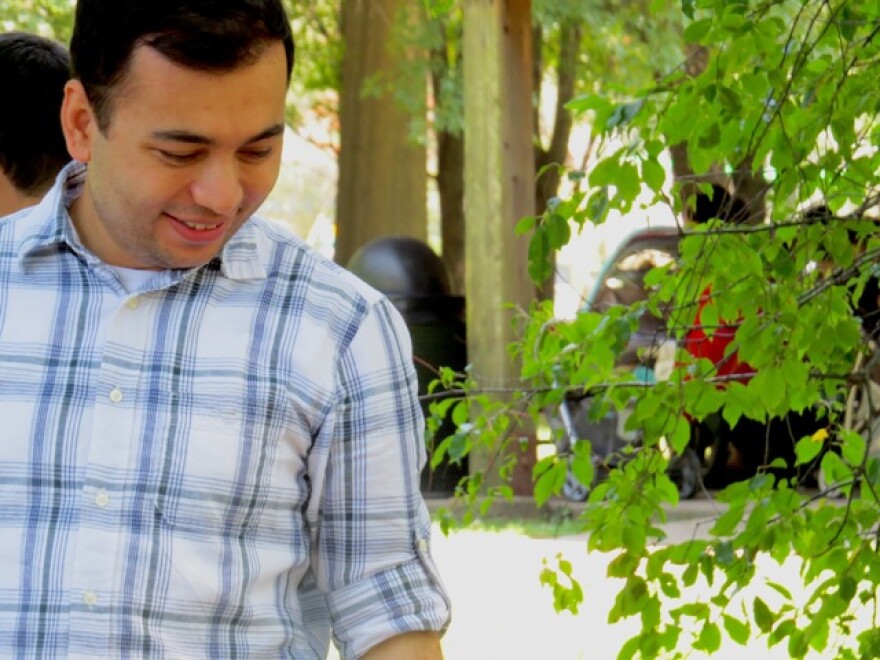This article first appeared in the St. Louis Beacon: More than 100 Uzbek immigrants and their families gathered at a park in Olivette over the weekend to observe the Muslim holiday of Eid, a celebration to mark the end of the holy month of Ramadan.
The group couldn’t have asked for better weather. There were coolers overflowing with soda, a small pack of children manufacturing an elaborate sand castle, and tables of food, including plov — a national dish in Uzbekistan made of beef, rice and carrots.
Family, friends, and coworkers of the community joined in as well, including an Egyptian Coptic priest who stopped by to wish everyone, "Eid Mubarak."
It was the first gathering of its kind in St. Louis, a sign of the rapidly growing number of Uzbeks in the area. Community leader Anvar Zakirov founded the Uzbek Association of St. Louis this year after he saw a need to create a support network for new immigrants from Uzbekistan. He said the new organization will raise money to help new immigrants make the transition into American life: find housing, get a job and enroll the kids in school.
After the festivities, the group discussed electing a board for the new organization.
The number of Uzbek immigrants arriving in St. Louis has been on the rise in recent years. Zakirov estimates about 200 Uzbeks, in about 50 families, live in the St. Louis area.
“When I came [in 2006] there were only two or three families here,” he said. “[The community] has been growing every year.”
Most of St. Louis’ Uzbeks arrived as refugees, via Catholic Charities or the International Institute of St. Louis. Others are in the country on student visas or won a lottery commonly called the “diversity visa.” A few have married American citizens and become eligible for naturalization.
New York, Washington, D.C., and Phoenix all have notable Uzbek populations as well.
In St. Louis, most live in Ballwin, Creve Coeur or St. Charles. Often, organizations resettling refugees arrange for housing once the families arrive, but that doesn’t mean they’re placed in one neighborhood. Zakirov said that St. Louis’ Uzbeks are more spread out than other immigrant communities in the area, which is why he wanted to organize events like the Eid celebration.
Some new arrivals stay close to family, though. When Bokhodir Agzamov arrived in 2011, he and his wife lived with his sister and her family in Ballwin.
“But now that I have a job, we have our own [place] in Ballwin, as well” Agzamov said.
Uzbekistan is a Central Asian country that was once part of the Soviet Union. The region became part of the Russian empire in the mid 19th century, and was later incorporated into the U.S.S.R. It became an independent country in 1991 when the Soviet Union collapsed.
Zakirov, Agzamov and others are part of the handful of young immigrants who had a working knowledge of English before they arrived in the United States. Since many of the Uzbeks are refugees and were resettled by the United Nations, they often arrive with limited English skills, especially amongst older individuals. Zakirov said that is one of the biggest challenges facing the community.

“Many, many of the parents’ children are fluent [in English],” he added. “They act as their parents’ interpreters.”
Regardless of a language gap, Zakirov said many in the community face skepticism from an underlying xenophobia in American society.
“Most of us look different. We have accents. Most of us are Muslims – not everyone, though,” he said. “On a personal level, from my coworkers, classmates, I could feel that glass wall, if you will. I could still feel it. But if the person is putting it up, how could I break through?”
That challenge didn't stop him from entrepreneurship. In 2010, Zakriov and another local Uzbek founded UZ Trans, a trucking and logistics company.
“When we started the company, it was our third year in the country,” Zakirov said. “We knew nothing about laws and regulations, but all we had was our immigrant drive. The American dream -- we have to get it. We have to do it. We have to work hard for our children and our future.”
UZ Trans was, at first, run out of the second bedroom of Zakirov’s apartment. At the time he was also a full time student at UMSL, working two other jobs, and a father. Today UZ Trans employs over 50 people, including many Uzbeks.
“It keeps growing day by day,” he added.
But despite his and other immigrants’ success in St. Louis, Zakirov says he is caught up in a broken immigration system. He came to St. Louis on a student visa in 2006 with his wife and son, but he has still been unable to get U.S. citizenship, despite the success of his business that employs American citizens.
“My American friends say to me, ‘If they don’t want you, who do they want?’” Zakirov said.
Because of his status, his parents have not been able to acquire a visitor visa in the seven years he has lived in St. Louis.
“They’re convinced [my parents] are going to get here and want to immigrate,” he said. “But they don’t want to leave Uzbekistan.”
Another member of the community, who goes by the name Hershel had the same problem. His father had to apply for a visitor visa five times before he was allowed to visit – but he was able to be in St. Louis for Eid this year.
“They didn’t have any intention of immigrating here,” he said. “But you can’t prove that.”
For those families that have children born in the United States, like Bokhodir Agzamov, the situation is a bit more secure. Agzamov and his wife had tried to start a family in Uzbekistan, but their first son was born this year in St. Louis.
“I’m happy that he was born here,” Agzamov said of his 2-month-year-old son Abdulloh. “Maybe it was written that we would have our baby here.”
Abdulloh was one of many children, from infants to teenagers, at the Eid celebration, a sign that the community is largely made up of young, growing families. Agzamov also said it is these types of gatherings that will keep the community’s American-born children tied to their parents’ homeland.
“It’s good to have this community,” he said. “They don’t have this everywhere. There are some cities where the [Uzbeks that live there] never see each other.”

